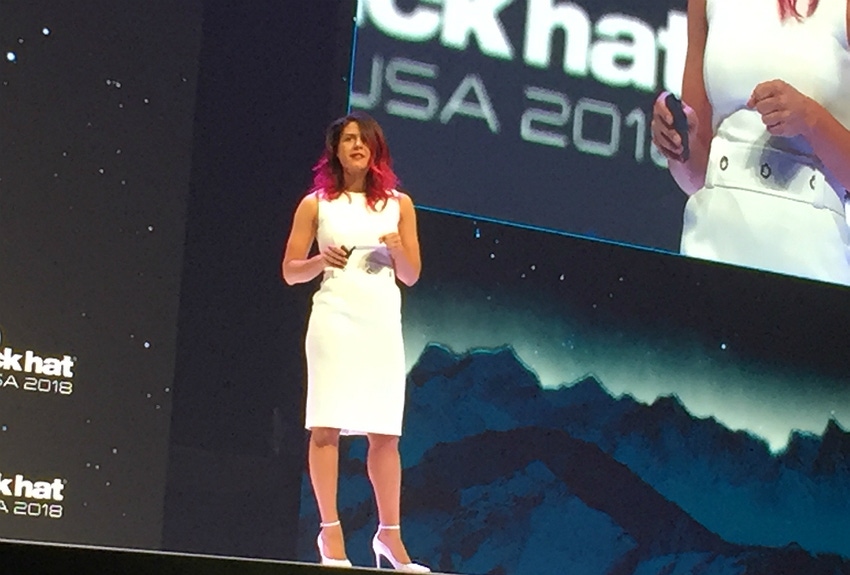A record 17,000 attendees are expected during Black Hat's six-day run.

(Pictured above: Google’s Parisa Tabriz on stage at Black Hat USA 2018, Aug. 8.)
BLACK HAT USA — More collaboration among cybersecurity providers is needed to continue making progress against ever-increasing cyber threats.
That’s one of the overall messages at this week’s Black Hat USA 2018 conference in Las Vegas. A record 17,000 attendees are expected during its six-day run.
Jeff Moss, Black Hat founder and director, told attendees this year feels like the industry is in the final exam stage to prove “if we’re as good as we say we are.” He also said the technology being developed is mostly offensive while cybersecurity defense is becoming increasingly political.

Black Hat’s Jeff Moss
“The General Data Protection Regulation (GDPR), that’s political, and soon we might have a California law to deal with,” he said. “Business models are running smack into political models.”
Maybe 20 companies globally are in a position to do something about raising “security resiliency for all of us,” Moss said. It’s up to everyone else in cybersecurity to put pressure on those companies to get those features, he said.
Parisa Tabriz, Google’s director of engineering, told attendees that great strides have been made in fighting cybercriminals during the past decade, but to be successful, “we have to stop playing whack-a-mole” and do a better job of identifying and tackling the root cause of cyber threats.
She also said it’s important to pick milestones and celebrate them, and build out your coalition of experts.
Tabriz is responsible for Chrome security and Project Zero, a security research team tasked with reducing harm associated with zero-day vulnerabilities. She also spoke about the team’s effort to gain widespread acceptance of switching from HTTP, the protocol over which data is sent between a browser and the connected website, to the more secure HTTPS. HTTPS adoption has skyrocketed globally since 2015.
“Making real change is hard; it results in pushback,” she said. “Making fundamental change to the status quo is hard. If you’re not upsetting anyone, you’re not changing the status quo.”
There’s so much more “intentional collaboration” that cybersecurity professionals can do together, Tabriz said.
“We don’t always agree on specific strategies, tactics … but we have similar goals,” she said. “The effort is so worth it.”
During Black Hat, managed detection and response provider eSentire and secure infrastructure provider Cyxtera announced a strategic partnership to deliver prevention and detection capabilities across customers’ hybrid IT environments. The two companies will jointly go to market to maximize customer reach for this midsize enterprise offering.
Chris Braden, eSentire’s vice president of global channels and alliances, tells Channel Partners that his company’s value proposition for partners is “tremendous, particularly with MSPs.”
“There’s a shortage of skilled security IT workers in the country; it’s very difficult to find and even more difficult to retain these employees,” he said. “It’s difficult for large enterprises to do so, and it’s particularly a challenge for …
… MSPs. MSPs traditionally had focused on the IT stack, but now increasingly those silos between IT and security have been coming down, and in order to stay relevant, and in order to decommoditize their offering, many MSPs now are finding that they have to offer security solutions for their customers. Yet with this shortage of workers in the IT security space, it’s very difficult for them to create value-added offerings to their customers to implement the technologies and help their customers manage them.”
eSentire’s offering doesn’t require those skilled IT security workers to implement it on behalf of the MSP’s customers, Braden said.
“So we give the ability to sell a security solution … without requiring the hard-to-find, hard-to-retain personnel to implement it,” he said. “We’ve seen a lot of interest on the part of MSPs.”
Perry Carpenter, KnowBe4‘s chief strategy officer, said channel is a big strategy for his company and is a “force multiplier.” The company provides security-awareness training.
“And we believe we can help channel partners as well because we’ve got a compelling offering,” he said. “Where we come in is helping people deal with the human side of security and with the fact that the vast majority of breaches right now happen because of some sort of human error. So the very fact that we can come in and help with the human side of security should be a compelling offering for the channel community.”
Cody Cornel is CEO and co-founder of Swimlane, which provides a security orchestration, automation and response (SOAR) platform.
“We have relationships with VARs, distributors, MSPs, boutique consulting firms, both commercial and federal, and we really support all of the above,” he said. “We’re continuing to expand our go-to-market and we’re very focused on [the] channel, and we’ve seen some really good success with some great logos across a broad variety of verticals that we’ve done with our channel partners. The channel is the trusted adviser to the great majority of the market that we’re trying to get to, so we really look forward working with those partners.”
Read more about:
AgentsAbout the Author(s)
You May Also Like


